In order to take care of indoor plants effectively and to maintain their beauty…
… you have to make sure they are fertilized.
There’s a huge variety of fertilizers that you can use with no ill effects on the plants…
Hear it from Timmy!
As a gardener, I’ve been asked a lot about fertilizers…
… in general or within specific topics of fertilizers…
… such as the use of store bought ones, or home-made ones.
My primary advice on fertilizing is identifying the needs…
… of each individual kind of plants…
… because each plant requires different feeding.
The type of fertilizer we give will affect the plant’s well-being…
Then, I also got questions such as how certain kitchen products…
… or household products be used as houseplant fertilizer.
Can every product be used as fertilizers?
Well no, but in this articles we will cover about coffee ground…
Some of the questions asked include whether it’s possible…
… to use coffee ground to fertilize indoor plants.
Coffee Grounds For Indoor Plants
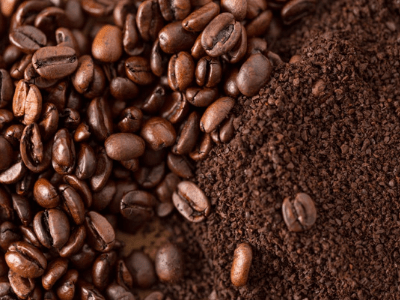
The ground coffee can also be used for fertilizing indoor plants…
… but make sure you make compost first.
If applied directly to the soil, coffee ground can cause exaggerated moisture retention…
… fungal overgrowth and even affect plant growth.
Read on to learn how to use coffee ground efficiently…
… without damaging your houseplants.
Coffee grounds are an excellent source of nutrients that indoor plants need, and they’re quite cheap…
Why Use Coffee Grounds To Fertilize Indoor Plants?
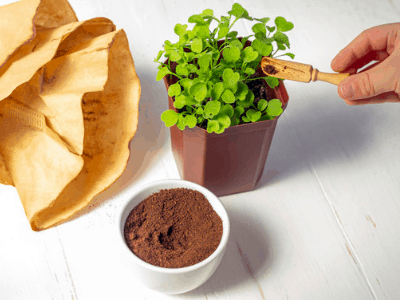
Most kitchen waste items, such as coffee ground…
… are full of essential nutrients that are discarded by most people.
The high-nitrogen content of these crops makes them…
… one of the most important nutrients for healthy plant growth.
Using coffee ground or other waste products on indoor plants…
… is another way to reduce household waste.
People have been using coffee ground for numerous years with some success in their gardening projects…
… so it is only natural they should experiment for the first time…
… with coffee ground as a fertilizer for their indoor plants.
The use of these is certainly something you should investigate…
… but they do pose significant issues.
Best Ways To Use Coffee Grounds To Fertilize Indoor Plants
Even though some people might be inclined to add coffee ground…
… directly to the top of the growing medium of their indoor plants…
… this practice is not advised and could result in a number of problems.
Although, there are three ways in which coffee ground can be used as a fertilizer for indoor plants…
Use Coffee Grounds To Make Compost
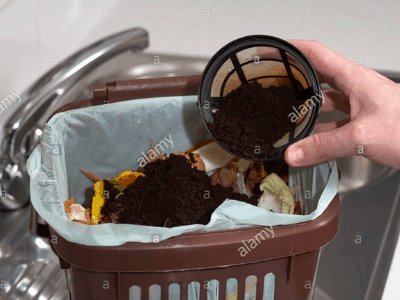
Composting used coffee grounds is by far the best way to utilize them…
Just add them to your compost pile and wait for them to be ready to use…
Only small amounts of coffee grounds are required for effective disease suppression. Therefore, I recommend using no more than 20% by volume of coffee grounds in a compost pile. A diverse feedstock will ensure a diversity of microorganisms.
Linda Chalker-Scott, Ph.D. MasterGardener WSU editor Extension Urban Horticulturist and Associate Professor, Puyallup Research and Extension Center, Washington State University
Indoor plants tend to be native to places with warm…
… tropical climates where most of their nutrition comes from decaying organic matter…
… which has been created by the dense vegetation around and above them.
The natural process of composting in your home recreates this naturally…
… and provides your houseplants with the nutrients they need to thrive.
By making a compost from coffee grounds…
You will be balancing the nitrogen content…
… with the other constituents of the compost you have made.
It is possible to either add a thin layer of this compost when repotting…
… or to work it into the surface of the ground.
The smell of home made compost can put off some people…
… especially those who are caring for houseplants.
Based on my experience, I have found it doesn’t matter…
Any smell from the compost dissipates very quickly…
… and it can be stopped in part by mixing it into the soil.
If you use home made compost on houseplants…
… there are two things to keep in mind.
Firstly, repeated application of compost can cause foliage burn and nutrient toxicity symptoms…
For this reason, only one inch of compost should be applied to the pot…
Secondly, as compost is rich in organic matter…
… it tends to retain water, increasing the chances of overwatering.
So if you need to water, take this into consideration and water only when necessary…
Make Liquid Coffee Houseplant Fertilizer
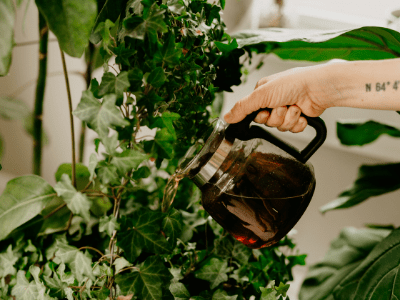
Although it is not recommended that you use coffee grounds to water your houseplants…
… you can make “compost tea” with coffee grounds and watered in a compost bucket.
You can make compost tea in many ways, but one of the easiest…
… is simply soaking the coffee grounds in a container…
… full of water for 1-2 weeks, stirring it every few days.
In the process of breaking down…
The coffee releases nutrients into the water…
… as well as providing a breeding ground for beneficial bacteria.
Once the liquid is strained through cheesecloth, you can use it on your plants…
Not only does this provide you with nourishment…
… but beneficial bacteria will be added, which will improve the health of the soil and your plants…
Add Coffee Grounds To The Potting Mix When Repotting
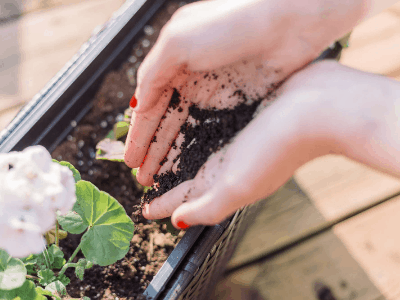
Due to the fact that coffee grounds are a natural product containing organic matter…
… they decompose slowly and release nutrients into the soil.
The grounds can be mixed with the potting mix you normally use for your plants…
… and used like a slow-release fertilizer.
Even though this may pose a number of problems…
… it can provide an ample supply of nutrients for a plant for up to six months, depending on the plant.
Houseplants can take advantage of coffee grounds as a natural fertilizer…
However, the key to success is to use them correctly…
Nitrogen is a substantial portion of coffee grounds compared to phosphorus and potassium…
When you use coffee grounds to fertilize your plants…
… you may not get the best results if they’re growing indoor plants…
… with relatively high requirements for phosphorus and potassium.
In my next section, I’ll talk about some of the drawbacks of using coffee grounds in your planting mix…
Problems With Using Coffee Grounds for Indoor Plants
Though we mentioned a few ways you can use coffee grounds for fertilizing your house plants…
… we need to emphasize some of the downsides as well.
Excess Moisture Retention
Ground coffee’s organic nature and fine particles are exceptionally good at retaining moisture…
Hence, they act as a sponge, absorbing moisture from the soil…
It is an important concern, as most people care for indoor plants…
… and their most common problem is overwatering.
You will increase the likelihood of overwatering by adding coffee grounds to your soil…
… and this can spell disaster for your houseplants.
The soil you use for your indoor plants should be altered…
… if you intend to use coffee grounds, either directly or as part of a compost.
This will reduce the risk of overwatering…
Increase drainage by adding more coarse sand or perlite to the potting mix…
… will be able to dry out more quickly after watering, reducing the risk of overwatering and root rot.
Other options include using a porous pot, and/or a planter with a smaller bottom…
Both these changes will result in faster dry times, reducing water exposure…
Promotes Fungal Growth
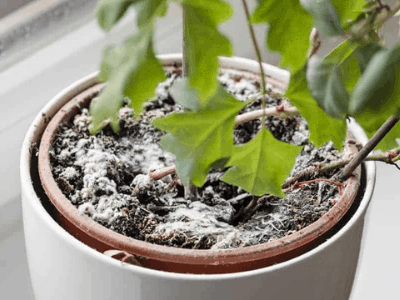
Coffee grounds that are added to the surface of the houseplant’s soil will pose a problem…
Coffee grounds can cause fungal disease in your plants…
… since they are a breeding ground for fungal organisms.
Particularly frustrating is when you try to care for your plants and support their health…
… only for them to be afflicted with a fungal disease that leaves them with a lot of damage.
Coffee grounds can be worked into the soil to reduce this problem…
Ideally, using coffee grounds compost or adding coffee grounds when repotting will reduce this risk…
Mold can often develop on the surface of houseplant soil when coffee grounds are added…
Attracts Pests
The soil conditions created from coffee grounds in your houseplants…
… may deter some insects and pests, but cause many others to be attracted into your house.
If you want to use coffee grounds to fertilize indoor plants…
… then composting coffee grounds is by far the best choice..
… rather than adding them to the surface of the soil.
Inhibit The Growth Of Some Plants
Coffee grounds have been shown to inhibit plant growth…
… particularly in seedlings and young plants, when added directly to the soil.
The caffeine in the grounds is believed to be responsible for this phenomenon…
This is the most straightforward option to using coffee grounds as a fertilizer for your indoor plants…
… and there appears to be no evidence that coffee grounds used for compost causes the same issue.
Better Alternatives
My conclusion is that using coffee grounds to fertilize houseplants is less than ideal…
There are many better natural or synthetic fertilizers available…
… and it is most likely better to use coffee grounds to fertilize outdoor plants…
… or to make use of this kitchen waste in some other way.
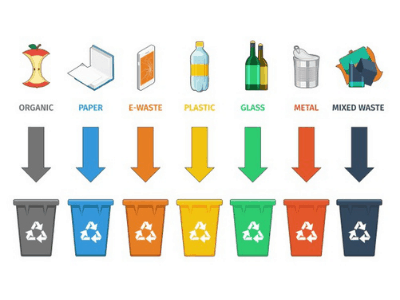
People can now request their kitchen and garden waste to be collected separately from the rest of their waste…
This allows local councils to compost this organic waste and re-use it in appropriate settings…
To sum it up…
Coffee grounds are an acceptable fertilizer for indoor plants, however…
… you’ll want to avoid the problems they come with.
Usually, coffee grounds are appropriate for outdoor gardens and alternate fertilizer options for houseplants…
In order to get the most benefit generated from coffee grounds…
… composting them or making compost tea with them is much more likely to yield a positive result…
Conclusion
Now that you know that you can actually fertilize indoor plants with coffee grounds…
It’s time for you to try it out by yourself…
… and comment down below or contact us…
… if you still have any queries or experiences to share!
Have an awesome gardening journey!


